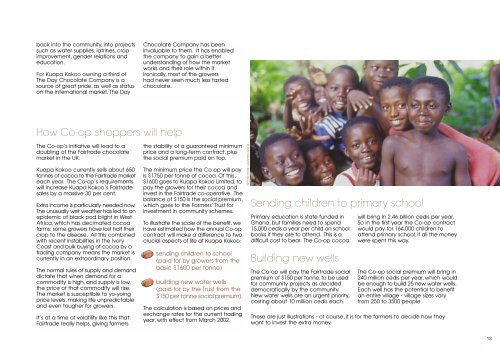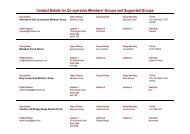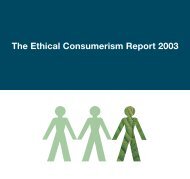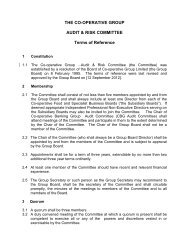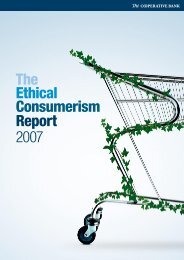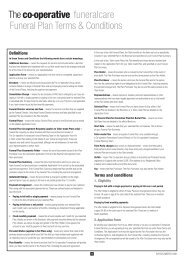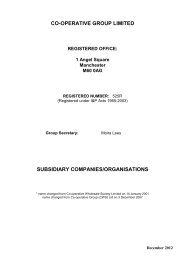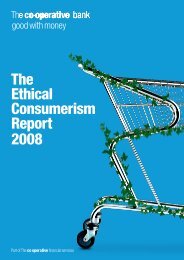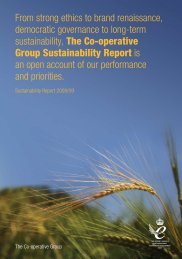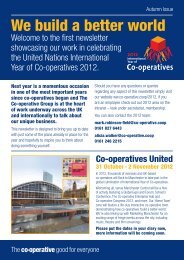Chocolate Report PDF - Fair Trade Barrie
Chocolate Report PDF - Fair Trade Barrie
Chocolate Report PDF - Fair Trade Barrie
You also want an ePaper? Increase the reach of your titles
YUMPU automatically turns print PDFs into web optimized ePapers that Google loves.
ack into the community, into projects<br />
such as water supplies, latrines, crop<br />
improvement, gender relations and<br />
education.<br />
For Kuapa Kokoo owning a third of<br />
The Day <strong>Chocolate</strong> Company is a<br />
source of great pride, as well as status<br />
on the international market. The Day<br />
<strong>Chocolate</strong> Company has been<br />
invaluable to them. It has enabled<br />
the company to gain a better<br />
understanding of how the market<br />
works and their role within it.<br />
Ironically, most of the growers<br />
had never seen much less tasted<br />
chocolate.<br />
How Co-op shoppers will help<br />
The Co-op’s initiative will lead to a<br />
doubling of the <strong>Fair</strong>trade chocolate<br />
market in the UK.<br />
Kuapa Kokoo currently sells about 650<br />
tonnes of cocoa to the <strong>Fair</strong>trade market<br />
each year. The Co-op’s requirements<br />
will increase Kuapa Kokoo’s <strong>Fair</strong>trade<br />
sales by a massive 30 per cent.<br />
Extra income is particularly needed now.<br />
The unusually wet weather has led to an<br />
epidemic of black pod blight in West<br />
Africa, which has decimated cocoa<br />
farms: some growers have lost half their<br />
crop to the disease. All this combined<br />
with recent instabilities in the Ivory<br />
Coast and bulk buying of cocoa by a<br />
trading company means the market is<br />
currently in an extraordinary position.<br />
The normal rules of supply and demand<br />
dictate that when demand for a<br />
commodity is high, and supply is low,<br />
the price of that commodity will rise.<br />
The market is susceptible to yo-yoing<br />
price levels, making life unpredictable<br />
and even tougher for growers.<br />
It’s at a time of volatility like this that<br />
<strong>Fair</strong>trade really helps, giving farmers<br />
the stability of a guaranteed minimum<br />
price and a long-term contract, plus<br />
the social premium paid on top.<br />
The minimum price the Co-op will pay<br />
is $1750 per tonne of cocoa. Of this,<br />
$1600 goes to Kuapa Kokoo Limited, to<br />
pay the growers for their cocoa and<br />
invest in the <strong>Fair</strong>trade co-operative. The<br />
balance of $150 is the social premium,<br />
which goes to the Farmers’ Trust for<br />
investment in community schemes.<br />
To illustrate the scale of the benefit, we<br />
have estimated how the annual Co-op<br />
contract will make a difference to two<br />
crucial aspects of life at Kuapa Kokoo:<br />
sending children to school<br />
(paid for by growers from the<br />
basic $1600 per tonne)<br />
building new water wells<br />
(paid for by the Trust from the<br />
$150 per tonne social premium).<br />
The calculation is based on prices and<br />
exchange rates for the current trading<br />
year, with effect from March 2002.<br />
PHOTOGRAPHY: Brian Moody<br />
Sending children to primary school<br />
Primary education is state funded in<br />
Ghana, but families need to spend<br />
15,000 cedis a year per child on school<br />
books if they are to attend. This is a<br />
difficult cost to bear. The Co-op cocoa<br />
Building new wells<br />
The Co-op will pay the <strong>Fair</strong>trade social<br />
premium of $150 per tonne, to be used<br />
for community projects as decided<br />
democratically by the community.<br />
New water wells are an urgent priority,<br />
costing about 10 million cedis each.<br />
will bring in 2.46 billion cedis per year.<br />
So in the first year the Co-op contract<br />
would pay for 164,000 children to<br />
attend primary school, if all the money<br />
were spent this way.<br />
The Co-op social premium will bring in<br />
240 million cedis per year, which would<br />
be enough to build 25 new water wells.<br />
Each well has the potential to benefit<br />
an entire village - village sizes vary<br />
from 250 to 3500 people.<br />
These are just illustrations - of course, it is for the farmers to decide how they<br />
want to invest the extra money.<br />
13


